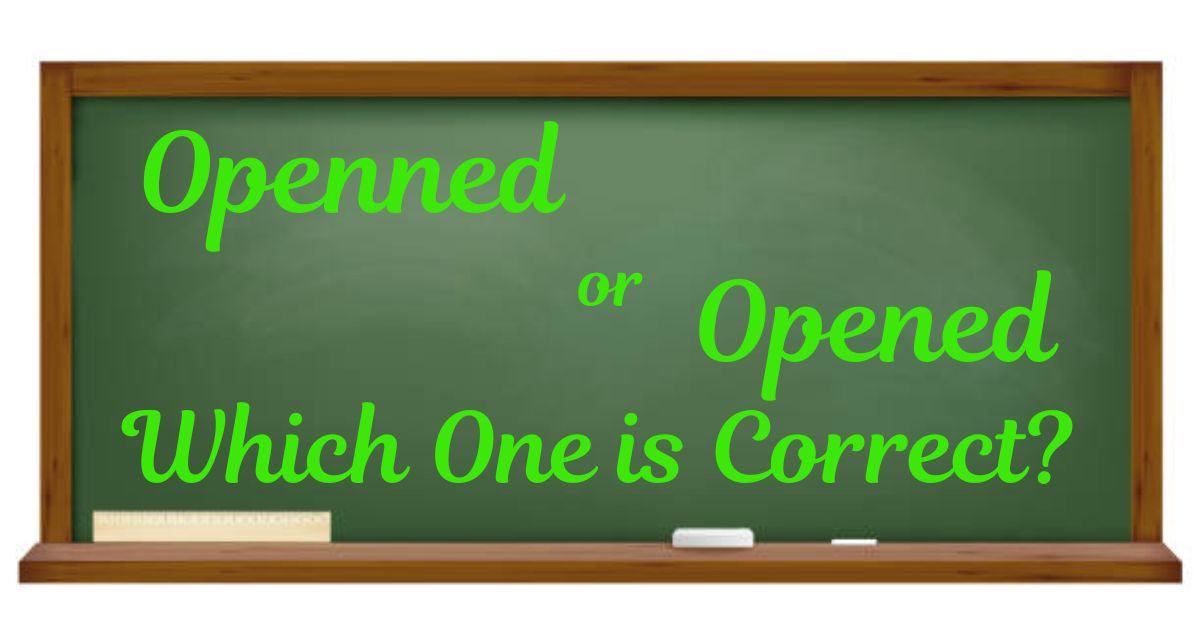“Openned or Opened” this common confusion often trips people up when dealing with English spelling variations. While both might look similar at first glance, only one is correct in standard English.
Understanding the difference between them not only improves your communication skills but also ensures clarity in professional and everyday writing. So, let’s dive deep into the spelling rules and proper usage to settle this once and for all.”
Definition and Correct Spelling
In English, opened is the correct past tense and past participle of the verb “open.” It’s used to describe actions that involve making something accessible, like opening a door, a book, or even a conversation. For example, “She opened the door to let fresh air in” is grammatically correct.
The word openned, on the other hand, is simply a misspelling. Unlike some English verbs that double their consonants when forming the past tense such as “planned” or “stopped” the word “open” does not follow that rule. Adding an extra “n” violates standard English spelling conventions. Learning and practicing these rules is key to avoiding mistakes like this.
Openned: Why It’s Incorrect
The primary reason openned is incorrect lies in the basic rules of forming the past tense in English. For most regular verbs, adding “ed” is sufficient. Doubling the consonant before adding “ed” happens only when the verb ends with a single vowel followed by a consonant, like in “plan” becoming “planned.” Since “open” ends with a vowel-consonant combination that doesn’t fit this rule, it retains its single “n” in the past tense. This misunderstanding often arises because learners overgeneralize spelling patterns.
For instance, writing, “She openned the box,” is grammatically wrong. The correct sentence would be, “She opened the box.” Such errors can distract readers and diminish the writer’s credibility, especially in professional or academic contexts.
Everyday Usage Examples
Scenarios in Daily Life
The word opened frequently appears in daily conversations and writing to describe simple, relatable actions. For example, “He opened the fridge to grab a drink,” or “She opened her notebook to jot down an idea.” These examples demonstrate how natural and essential this word is for everyday communication. In contrast, using openned would likely confuse readers or listeners.
Scenarios in Business and Technology
In professional settings, precision in language is crucial. Consider a company announcing, “We have opened a new branch in Los Angeles.” This clear and correct usage conveys professionalism. Similarly, in technology, phrases like “The software opened quickly” are common. Using “openned” in such contexts would undermine the credibility of the message and could even lead to misinterpretation.
| Feature | Openned | Opened |
| Correctness | Incorrect | Correct |
| Usage | Grammatically invalid | Standard English usage |
| Examples | “She openned the door” | “She opened the door” |
| Recognition | Not accepted | Universally accepted |
The Role of “Opened” in Different Contexts
Literature and Art
In literature and art, the word opened is often used metaphorically. A book might “open up new worlds,” or a painting might “open a dialogue about societal issues.” Such figurative uses elevate the significance of the term, connecting it to broader ideas and emotions. Writers and artists frequently use this word to invite interpretation and discussion.
Sports and Events
In sports, opened is used to mark beginnings or highlight pivotal moments. For example, “The stadium opened its gates to thousands of fans,” or “The athlete opened the match with an impressive serve.” These usages capture the excitement and dynamism of events, making them more engaging for audiences.
Frequently Asked Questions
Why is “openned” not a valid word in the English language?
The word openned violates standard spelling rules for forming the past tense. Doubling the final consonant is unnecessary for words like “open,” which already contain a vowel-consonant ending.
How can one improve their spelling skills to avoid using incorrect words like “openned”?
Improving spelling skills requires consistent practice. Reading regularly, using tools like dictionaries or spell-checkers, and studying common spelling patterns can help. Engaging in writing exercises and seeking feedback from peers or mentors also boosts accuracy.
What can I say instead of opened?
Depending on the context, you might use synonyms like “unlocked,” “unveiled,” “revealed,” “initiated,” or “launched.” For example, instead of saying, “She opened the conversation,” you could say, “She initiated the discussion.”
What is the past perfect tense of open?
The past perfect tense of “open” is “had opened.” For instance, “By the time we arrived, they had opened the store.”
What is the proper tense of open?
The proper tense depends on usage. In the present tense, it’s “open.” For past events, use “opened.” For future actions, say “will open.”
What’s another way to say opened up?
Alternatives include “revealed,” “unveiled,” or “disclosed,” depending on the meaning. For instance, “He opened up about his struggles” could become “He disclosed his challenges.”
What does the idiom open to mean?
The idiom “open to” means being receptive or willing. For example, “I’m open to suggestions” indicates a willingness to consider new ideas.
What is the phrasal verb of open?
A common phrasal verb is “open up.” It can mean to share feelings (“He opened up about his fears”) or to make something accessible (“They opened up the venue for the event”).
Read More: Shiney or Shiny: What’s the Difference?
Read More: Fairing vs Faring: What’s The Difference?
Conclusion
Understanding the difference between openned and opened is essential for clear and effective communication. While opened follows standard grammatical rules and is universally accepted, openned is an incorrect variation that should be avoided. Whether you’re writing professionally, engaging in creative work, or simply communicating in everyday life, using correct spelling strengthens your credibility and ensures your message is easily understood. By mastering these rules and practicing regularly, you can confidently navigate the nuances of the English language.

